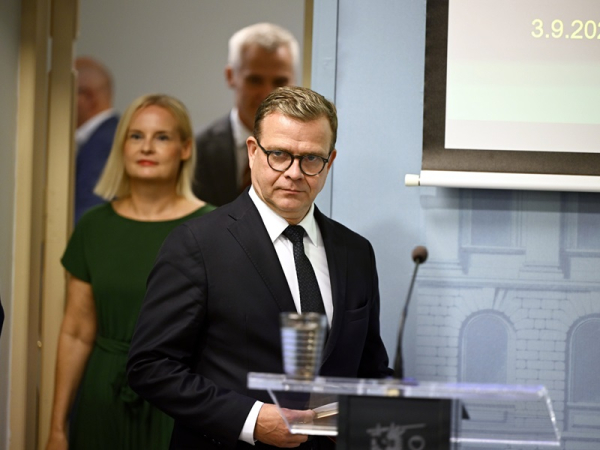
Prime Minister Petteri Orpo (NCP) arrived for a press conference concerning the central government budget for next year, followed by Minister of Finance Riikka Purra (PS) and Minister of Education Anders Adlercreutz (SFP), in Helsinki on Tuesday, 3 September 2024. Economists have continued to urge the government to do more than tinker at the edges of business subsidies in Finland. (Antti Aimo-Koivisto – Lehtikuva)
- Next Article YLE: Social Democrats reclaims top poll spot from National Coalition
THE GOVERNMENT of Prime Minister Petteri Orpo (NCP) could have easily created substantial cost savings by rationalising the jungle of business subsidies, Elias Erämaja, the chief economist at Suomen Ekonomit, stated to YLE in August.
Erämaja examined the business subsidy system, identifying roughly 500 million euros in subsidies that, mostly, boost the competitiveness of large corporations or stem from regional political interests.
A lion’s share of the savings were achieved by reducing the electrification subsidy for energy-intensive industries, the reimbursement scheme for labour costs in the marine sector and the fuel subsidy for transport companies and work machine companies. The government is spending billions of euros annually on the subsidies, supporting the likes of Stora Enso, UPM and Viking Line.
“The electrification subsidy is an income transfer to large corporations, which would be making investments in clean energy whatever the case. The marine subsidies, in turn, are high and don’t have a massive impact on security of supply,” Erämaja explained to the public broadcaster on 31 August.
“Maintaining a particular industry or making concessions for some types of energy distorts the market and takes up more taxpayer money.”
His list also included subsidies for regional flights, fur farming and small and medium enterprises in rural regions.
While the Finnish government made cuts of 50 million euros in business subsidies last spring, the subsidy system has come under a steady stream of criticism, with many experts viewing that it distorts competition and preserves outdated industrial structures. Subsidies are questionably also used to prop up fossil fuels: the tax exemption for the light fuel oil used by work machines costs more than 400 million euros and subsidies for peat production tens of millions of euros a year.
Companies in Finland received three times as much in brown than green subsidies in 2020–2022, according to an analysis carried out at Etla Economic Research. Heli Koski, a research director at Etla, said the finding was surprising.
While the focus has shifted toward green subsidies in 2023–2024, Koski estimated that well over a half of business subsidies remain regressive and have been designed to preserve rather than reform segments of the economy. She stressed that subsidies should instead be designed to offset market deficiencies and produce new data or technology.
“They should be targeted at projects that benefit society more broadly,” she outlined to YLE.
Also business owners are in favour of rationalising business subsidies. The Federation of Finnish Enterprises reported five years ago that 48 per cent of business owners are in favour of and 37 per cent opposed to scrapping some subsidies, many citing the unfair nature of the subsidy system.
The federation had proposed two years earlier that the government slash spending on subsidies by about half a billion euros.
Aleksi Teivainen – HT
- Next Article YLE: Social Democrats reclaims top poll spot from National Coalition
Source: www.helsinkitimes.fi
